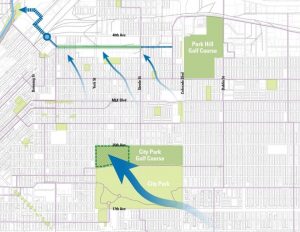Clayton and City and County of Denver Agreement
On Sept 22, 2017 at 3:30 pm the Clayton Foundation and the City and County of Denver convened a press conference to announce that a agreement had been struck.
http://www.denverinc.org/wp-content/uploads/2017/09/clayton-denverPressRelease.pdf
The contract was presented and “the proposed deal, which would require the approval of the Denver City Council, would have Denver pay $20.5 million over the course of 30 years for the property.”
The Denverite Andrew Kenney Sept 21 2017 Denver plans to buy Park Hill Golf Club for $21 million; golf unlikely to survive there
http://www.denverinc.org/wp-content/uploads/2017/09/contract-clayton9-21-17.pdf
“But city officials long made no commitments, beyond working on plans to use up to 25 acres on the northeast corner of the Park Hill course for a stormwater detention area.
That is one of four key projects in the controversial Platte to Park Hill stormwater drainage plan in northeast Denver — and the one part of the course that is probably guaranteed to remain as open space in some form.
The city plans to tap a wastewater fund that is paying for the drainage projects to cover a $10 million down payment for the property, city finance spokeswoman Courtney Law said. Denver then would pay Clayton $350,000 a year in lease-to-own payments for 30 years, totaling $10.5 million, using its annual capital projects budget.”
Denver Post 09222017 Jon Murray Denver locks $20.5 million deal to buy Park Hill Golf Club, but its future as open space is unclear
The “agreement will come with an early buyout provision. If all the payments are made, Denver could end up paying the trust $10.5 million on top of the initial $10 million payment, which would result in $20.5 million being spent on the land.
Between 20 and 25 acres are expected to be set aside for golfing, open space or park space as part of the Platte to Park Hill storm-water program tentatively approved by the city council in mid-August.”

updated January 2016
Channel 7 News Jennifer Kovaleski Sep 21 2017 Denver to buy Park Hill Golf Course, could pay $20 million over next 30 years
“The course currently is zoned as open space. The agreement requires the city to hold community meetings to determine the final use of the land. And per zoning laws, the city would need to create a master plan for the parcel before any rezoning or development.
“What we’re trying to do is provide as much flexibility for a future use, or future uses of the property,” Dreyer said. “There are not many properties like this left in the city.”
The city has the option to buy out the lease on the 75 acres before the 30-year term ends. Brantley also said that if Denver sells any parcel to developers, Clayton will get 75 percent of the proceeds.
The deal still needs several more signatures of approval.
Course operator Arcis has a right of first refusal on any sale – part of an agreement it inherited when it took over operations from another golf course management firm.
The deal also needs to go before a probate court because the land at Park Hill is operated by Clayton as part of a trust. Brantley said Clayton is working to get the agreement on the docket.”
Business Den City of Denver strikes $20M deal to buy Park Hill Golf Course
1982 – The Colorado Attorney General’s Office files a lawsuit to remove the City and County of Denver as the Trustee of the George W. Clayton Trust for the City’s alleged self-dealing with the Trust’s assets, including the Park Hill Golf Course. The City resigns as the Trustee and University of Denver Chancellor Chester Alter is named as interim Trustee.
1984 – The Clayton Foundation is created and becomes the permanent Trustee of the George W. Clayton Trust. The Clayton Foundation is governed by a volunteer Board of Trustees.
1986 — The Clayton Foundation hires a real estate firm to market the Park Hill Golf Course property for sale. In November of 1986, Clayton enters into an agreement to sell the property to L.C. Fulenwider, Inc. for $10.6 million. Fulenwider’s purchase of the property is contingent upon the successful rezoning of the property for a mixed-use development that includes retail and light-industrial uses.
1988 — As a result of the economic and real estate downturn in Denver during the late 1980’s and resistance to the rezoning from surrounding neighborhood groups such as Greater Park Hill, North Park Hill and City Park North, L.C. Fulenwider terminates the purchase and sale agreement in 1988. Rather than remarket the property for sale in an unsupportive economic and political environment, Clayton’s Board of Trustees decides to hold the property and renegotiate the golf lease to increase the rental payment to a “market” rate.
1989 — In an effort to save the Park Hill Golf Course from development once the market improved, then Denver City Councilperson Cathy Reynolds includes a line item in the City’s $300 million Bond Referendum that earmarked “$2 million towards the purchase of the Park Hill Golf Course.” Councilperson Reynolds was an avid golfer who played regularly at the Park Hill Golf Course. The $300 million Bond Referendum passes.
1994 — Mayor Wellington Webb’s director of special projects, Andrew Wallach, approaches Clayton about the $2 million earmarked for the course. He asks whether Clayton would grant the City a perpetual Conservation Easement on the course in exchange for the $2 million. The Conservation Easement would allow Clayton to continue to operate the property as a golf course or open space, but would preclude development of the property.
To determine if the $2 million was sufficient compensation for the potential development rights it would be giving up, Clayton goes through an appraisal process and the appraiser concludes that the value of the property as a golf course is $6 million and the value under a highest and best use scenario is $8 million. Essentially, the appraiser concludes that the value of the potential development rights at that time was $2 million.
1997 — Based upon that conclusion, Clayton grants a perpetual Conservation Easement on the golf course property to the City and County of Denver in exchange for payment from the City of $2 million. The perpetual Conservation Easement limits the use of the property to open space in general and a golf course in particular.
1998 – Clayton issues a request for proposal to prospective lessees of the course, including American Golf Corporation and Arnold Palmer Golf. In late 1998, Clayton enters into the current 20-year lease with American Golf Corporation. AGC agreed to pay Clayton $500,000 in year one, $550,000 in year two, $650,000 in year three and $700,000 in years four through 20.
2000 – The Office of the Assessor for the City and County of Denver informs Clayton that even though the owner of the course, The George W. Clayton Trust, is a tax-exempt entity, the lessee of the course is not. As a result, American Golf Corporation is subject to a Possessory Interest Tax. Because American Golf entered into the Lease with the understanding that the property was tax-exempt and that Clayton would be responsible for any real estate taxes, Clayton would be required to reimburse American Golf for the Possessory Interest Tax. This was a significant unforeseen expense to Clayton.
To address this unforeseen expense, Clayton submits a proposal to the City whereby the City would release the Conservation Easement, Clayton would convey fee simple title to the City but would retain control of the beneficial use of the property under an Agency Agreement similar to the one that was in place at the time in Winter Park. Because the City would hold legal title to the property, the property would once again be tax exempt.
Clayton and the City enter into the Agreement provided that Clayton may terminate the Agency Agreement at any time and the City would convey legal title back to Clayton. If that occurs, however, the Agency Agreement requires that the Conservation Easement must be put back in place and the lessee would once again become subject to the Possessory Interest Tax.
2008 – American Golf Corporation assigns the lease to EAGLE Golf.
2015 – EAGLE Golf assigns the lease to Arcis Golf. The lease expires at the end of 2018.
In summary, the golf course property is currently encumbered by an Agency Agreement and perpetual Conservation Easement that limits the use of the property to open space in general and a golf course in particular – separate and apart from the underlying zoning of the property.
A History of PHGC – Sept 2017 – final
![]()
![]()




I urge all Denver citizens to make their voice heard loud and clear to their council person that “DEVELOPERS NEED NOT APPLY” Keep this open space for future residents. If any request to rezone to commercial property, any council person who approves needs to be shown the door on future elections..The city is trying to destroy City Park and Overland with questionable/ lawsuit driven scams and our voice needs to b e heard, now and at election time…..remember…all votes count.